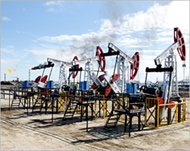Russia set to ratify Kyoto
The Russian cabinet has approved the ratification of the Kyoto Protocol on combating global warming.

Thursday’s move cleared the way for parliament to vote on the international pact, which needs to be ratified by Moscow to take effect.
The cabinet has to submit a draft bill on ratification of the protocol to the state Duma, the lower parliament, which approves nearly all bills backed by President Vladimir Putin.
A government official, who spoke on condition of anonymity, said the ratification bill would be submitted to parliament shortly so that the Duma could ratify it before the end of the year.
Putin pledged in May to speed up approval of the protocol in return for European Union support of Russia’s bid to join the World Trade Organisation (WTO).
“It’s a political decision, it’s a forced decision” to ratify Kyoto, Putin’s economic adviser Andrei Illarionov, who led Russian opponents of Kyoto, told the cabinet, Interfax news agency reported.
Global warming
“It’s not a decision we are making with pleasure.”
|
“It’s a political decision, it’s a forced decision [to ratify Kyoto]. It’s not a decision we are making with pleasure” |
The 1997 Kyoto Protocol seeks to reduce emissions of carbon dioxide and other greenhouse gases, which are widely seen as a key factor behind global warming.
The EU has long urged Russia to ratify the pact, which must be joined by no fewer than 55 countries that accounted for at least 55% of global emissions in 1990.
That minimum now can be reached only with Russia because the US, China and some other big industrial nations have rejected the treaty.
Illarionov and other Russian foes of the Kyoto protocol have argued that joining the pact would stymie Russia’s economic growth and make Putin’s goal of doubling gross domestic product in a decade unattainable.
The protocol calls for countries to bring their emissions down to 1990 levels by 2012.
Industrial production
If a country exceeds the emissions level, it could be forced to cut back industrial production.
Russia’s emissions have fallen by 32% since 1990 largely due to the post-Soviet industrial meltdown, but they have started to rise again amid the economic revival of the past few years.
 |
|
Greenhouse gas emissions in |
Illarionov continued his scathing attack on the pact on Thursday even though he acknowledged that Russia needed to ratify it for political reasons.
“We mustn’t cherish illusions about positive or neutral consequences” of the pact, he told the cabinet, according to Interfax. “This will concern each of our citizens.”
Some observers have speculated that Russia has wavered on the Kyoto ratification because it was jockeying for more favourable terms when rules are worked out.
They say Russia wants a mechanism under which countries that come in with emission levels below the targets can sell credits to nations that still need to reduce emissions.